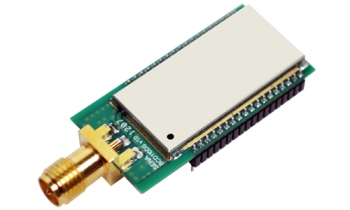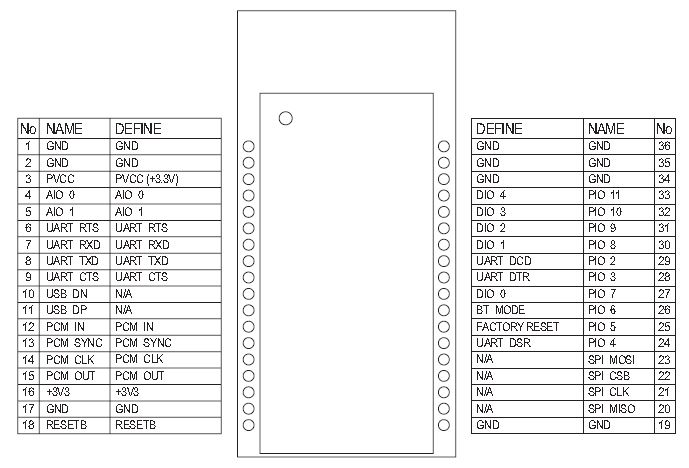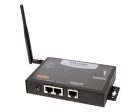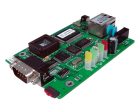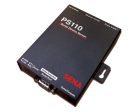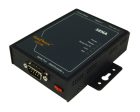Product Description
BCD110V3-DS-00 Sena Parani-BCD-110V3-DS Bluetooth embedded OEM module DIP type, Class 1 with SMA Connector
This is a fully qualified Bluetooth v2.0 EDR specification so OEM manufacturers can save cost and time for overall OEM product certifications, which makes it an ideal solution for larger volume and cost sensitive applications.
FEATURES
Bluetooth v2.0 EDR
Integrated 8Mbit Flash Memory
Standard HCI over UART or USB
Digital I/O with up to 7 simultaneous multiple connections.
Supports Serial Port Profile(SPP), Sena I/O profile, SCO connection
Longer communication distance typically ranges from 200m up to 1000m.
Supports UART, USB, PCM, PIO interfaces for the communication with the OEM products.
APPLICATIONS
– Automotive applications – Medical Systems
– Remote metering devices – POS (Point-of-sales) devices
– PCs/Personal Digital Assistants (PDA) – Bluetooth USB dongle
– High-speed data transceiver systems for long distance communication
– Bluetooth serial dongle – Bluetooth access points – Industrial automation devices
It is designed to work out-of-box for real world SPP applications such as POS (Point-of-sales), industrial automation, remote metering and other various applications. Optionally, the BCD110V3 can be supplied with only software stack up to HCI level so entire Bluetooth stack runs on the host side for the application such as USB dongles for computers, or OEM manufacturers can even develop and embed their own firmware into the BCD110V3.







Overview
BCD110V3 series
· Bluetooth Class 1
· Bluetooth v2.0 EDR specification
· Transmit Power: 18dBm Typical
· Receive sensitivity: -90dBm (0.1% BER)
· Integrated 8Mbit Flash Memory
· Supports Serial Port Profile (SPP), Sena I/O Profile, SCO Connection
· Working distance (In an open field): Nom.200m, up to 1000m
· Supports built-in chip, stub and dipole antennas
· 802.11 co-existence
· Standard HCI over UART or USB
· Field-proven SPP (Serial Port Profile) firmware supporting up to 4 simultaneous multiple connections
· Firmware upgrade via windows-based software(ParaniUpdater)
· Easy to use Windows configuration tool available.
· ROHS compliant
Optional Accessories for BCD110V3 series
– BCD110V3-SK-05: Starter kit for Parani-BCD110V3 (generic)
– SAT-G01R: 1dBi Stub Antenna, RP-SMA Plug, Right-hand thread
– DAT-G01R: 3dBi Dipole Antenna, RP-SMA Plug, Right-hand Thread
– DAT5-G01R: 5dBi Dipole Antenna, RP-SMA Plug, Right-hand Thread
– SEC-G01R: 15cm RPSMA Antenna Extension Cable, Right-hand Thread
– UEC-G01R: 12cm U.FL to RPSMA Cable, Right-Hand Thread
Tech Specs
BCD110V3 series
Bluetooth: v2.0 EDR, Class1
Profile: SPP(Serial Port Profile), Sena I/O, Profile
Working distance: By default antenna is 200m (0.12 mile), Supports up to 1000m (0.62 mile)
Electrical
– Transmit Power: 18dBm Typical
– Receive Sensitivity: -90dBm (0.1% BER)
– TX Output Spectrum Frequency range: 2402 MHz – 2480 MHz
Interfaces
– UART,
– USB,
– I2C,
– PCM,
– PIO
Serial Interfaces:
– Serial UART speed up to 921.6kbps,
– CTS/RTS flow control,
– DTR/DSR for loop-back & full transfer
I/O interface:
-5 DIO, 2 AI
Pin Interface:
– BCD110V3-Sx: 1.27mm SMD Pad 18 x 2 (36pin)
– BCD110V3-Dx: 1.27mm Pin Header 18X2 (36pin)
USB Interface: V2.0
Configuration:
– ParaniWIN, Modem AT command set
Firmware Update:
– ParaniUpdater
Power:
– Nominal : 70mA@3.3Vdc
– Maximum : 150mA@3.3Vdc(200mA@3.3Vdc in Test Mode)
Environmental:
– Operating temperature: -40°C ~ 80°C
– Storage temperature: -40°C ~ 85°C
– Humidity: 90% (Non-condensing)
Dimensions:
– DIP type: 34.6 x 16.8 x 7.5 mm (0.661 in x 1.362 in x 0.295 in)
– SMD type: 34.6 x 14.8 x 3.0 mm (1.362 in x 0.583 in x 0.118 in)
Weight:
– Parani-BCD110V3-SC: 2g
– Parani-BCD110V3-SU: 2g
– Parani-BCD110V3-DC: 3g
– Parani-BCD110V3-DU: 3g
– Parani-BCD110V3-DS: 4g
Approvals:
– FCC, CE, IC, KC, TELEC, SIG
Warranty:
– 1 year limited warranty
Bluetooth v2.0 supports improved AFH function. AFH function is to mitigate the interference between WiFi and Bluetooth radios by automatically avoiding the active WiFi channel from Bluetooth link. However, AFH does not provide a complete solution making WiFi and Bluetooth work together in harmony. It is highly recommended for users to test their wireless system enough before deployment since the overall system performance is affected by various environmental factors such as distance between them.
![]()
![]()
![]()
![]()
![]()
![]()
![]()


